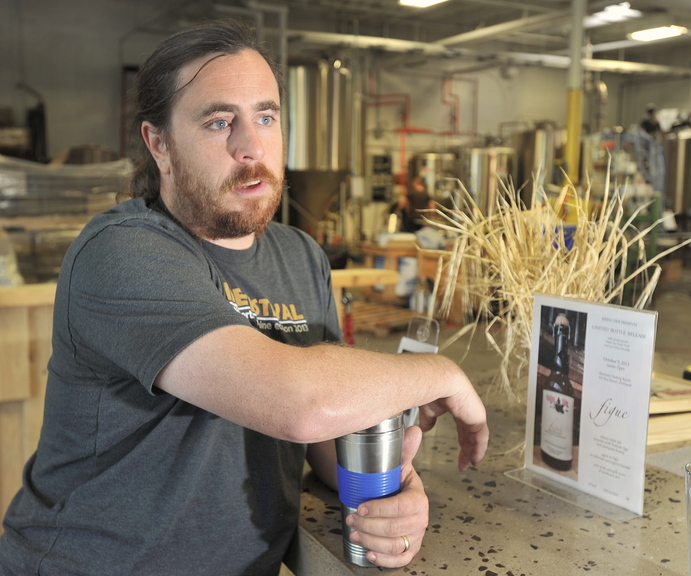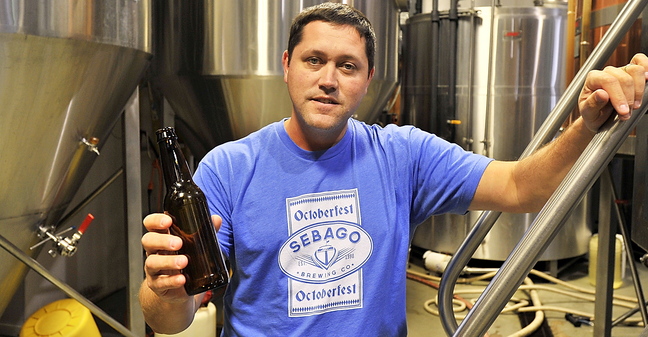The prolonged government shutdown is squeezing an unlikely victim with a growing presence in Maine – the craft brewing industry.
An obscure agency known as the Alcohol and Tobacco Tax and Trade Bureau – a division of the U.S. Department of Treasury that oversees breweries – has furloughed all but 35 of its 483 employees since Oct. 1. That means no one is available to approve new breweries or what are known as certification of label approvals, which any beer must have before it can be sold. The applications for the certification typically come in at a rate of about 400 per day.
“If you don’t have that, you can’t go to market,” said Kai Adams, co-founder of Sebago Brewing in Gorham.
That could have a large impact for an industry that is growing in popularity in Maine. It has temporarily shut down not only applications for new breweries but also existing breweries’ ability to market themselves outside the state.
The craft brewing industry is in the midst of a tremendous period of growth, both in Maine and nationwide. From 2009 through 2012, beer production by Maine breweries increased from 4.1 million gallons to 7.9 million gallons.
Most national beers, such as Budweiser or Coors, have had their labels approved for years. As long as the recipe doesn’t change, no new label is needed.
But the Portland area’s growing number of craft brewers are constantly experimenting with new recipes and seasonal styles for eventual sale to the public. That means for any beer they create that uses nontraditional methods or nontraditional ingredients, or any time they tweak a beer recipe, they need a new label approval.
Adams said Sebago has one pending batch of beer that is “completely shut down” because of the government shutdown.
That beer is still sitting in a fermentation tank, waiting for a label so it can be bottled.
Rising Tide Brewery in Portland also has a batch that has been brewed and bottled but still needs federal approval, according to co-owner Heather Sanborn.
DeeDee Germain at Allagash Brewing in Portland said her brewery has several labels still awaiting approval.
For as long as the shutdown lasts, those brewers in Maine will only be able to sell new beers inside the state.
Sanborn said she and her husband, Nathan Sanborn, were recently told by the state’s liquor licensing unit that brewers can still bottle and label new beers without federal approval, as long as the beer is not sold across state lines.
It was a bit of good news for the state’s 35 or so brewers, many of which likely also have labels pending, but the long-term economic impact of the shutdown remains uncertain for the industry.
“The (beer) we have awaiting federal approval, it’s limited release, so we won’t have any trouble selling it all in Maine,” Sanborn said. “But there are marketing concerns.”
Rising Tide is trying to expand its market throughout New England, and part of that is offering new varieties as often as possible. The new varieties are small batches, she said, of about 100 cases.
“We release new labels all the time,” Sanborn said. “That’s a huge part of our industry.”
Sanborn said she isn’t sure whether her brewery will be hit hard by the shutdown.
“We can still brew our core beers,” she said. “But as a small-business owner, I want predictability.”
Adams, at Sebago, agreed there could be an impact in not being able to ship new labels out of state for the time being, but he hoped it would be short-lived.
“At least we can still sell it here,” he said.
Germain said Allagash is probably equipped to absorb any losses in the short term.
“The majority of our volume is stuff we’ve made for years,” she said. “If we can’t ship the (unlabeled beer) for another month, it’s not the end of the world.”
The backlog has not just affected label certifications; the Alcohol and Tobacco Tax and Trade Bureau also approves permits for new breweries, a process than can take two to three months.
Will Fisher, who is awaiting federal approval for a new brewery in Portland called Austin Street, said he and his business partners were all set to submit their application on Oct. 1. Now, they have to wait.
“We’ll continue to do other things to get ready, but you don’t want to go too long without having revenue come in,” he said.
Another new Portland brewer, Bissell Brothers, received its federal approval just before the shutdown.
Co-owner Peter Jensen Bissell said his brewery still does not have label approval yet, but he’s not concerned about that.
“We planned on serving only Maine to start anyway,” he said. “It’s too bad, though. You’ve got this one industry that’s actually doing well and that’s who suffers.”
The government shutdown, now into its third week, has affected other food and drink industries as well. The U.S. Food and Drug Administration has scaled back most of its food safety responsibilities, including inspections of food manufacturers. The U.S. Department of Agriculture has continued to inspect meat, poultry and egg producers but has furloughed more than 1,000 other food safety workers across the country. The Centers for Disease Control and Prevention also has halted activities such as detection and tracking of food-borne illnesses and outbreaks.
While those agencies are high-profile and their cutbacks were largely anticipated, craft brewery owners say they were caught off-guard by the shutdown of the Alcohol and Tobacco Tax and Trade Bureau.
The Boulder, Colo.-based Brewers Association, an industry trade group, has spoken out against the economic impact to brewers.
“In this era of smaller government, the (Alcohol and Tobacco Tax and Trade Bureau) has shrank staff for several years, and there had been a significant wait for services already,” group spokesman Paul Gatza said in a statement. “We were on a track to have between 400 and 550 brewery openings in 2013. More than one craft brewery per day on average was opening. Those new jobs and future tax revenues are on hold indefinitely.”
Eric Russell can be contacted at 791-6344 or:
erussell@pressherald.com
Twitter: @PPHEricRussell
Copy the Story LinkSend questions/comments to the editors.





Success. Please wait for the page to reload. If the page does not reload within 5 seconds, please refresh the page.
Enter your email and password to access comments.
Hi, to comment on stories you must . This profile is in addition to your subscription and website login.
Already have a commenting profile? .
Invalid username/password.
Please check your email to confirm and complete your registration.
Only subscribers are eligible to post comments. Please subscribe or login first for digital access. Here’s why.
Use the form below to reset your password. When you've submitted your account email, we will send an email with a reset code.